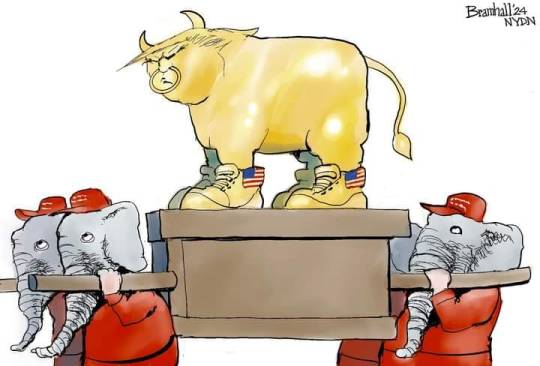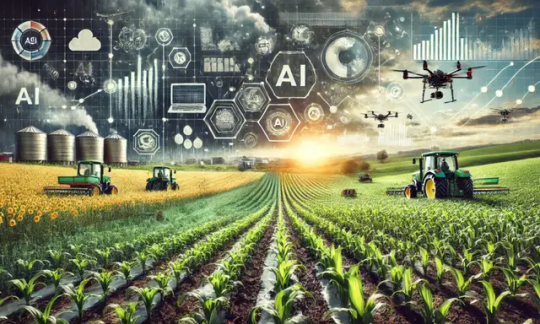#economic vision
Explore tagged Tumblr posts
Text

Bramhall
* * * *
LETTERS FROM AN AMERICAN
November 14, 2024
Heather Cox Richardson
Nov 14, 2024
Two snapshots today illustrate the difference between the economic—and therefore the societal—visions of the Biden-Harris administration and of the incoming Trump administration.
The Biden-Harris administration today released numbers revealing that over the past four years, their policies have kick-started a boom in the creation of small businesses across the country. Since the administration took office, entrepreneurs have filed more than 20 million applications for new businesses, the most of any presidential term in history. This averages to more than 440,000 applications a month, a rate more than 90% faster than averages before the pandemic. Black business ownership has doubled, and Hispanic business ownership is up by 40% since before the pandemic.
The administration encouraged that growth with targeted loans, tax credits, federal contracts, and support services. Small businesses are major job creators and employ about 47% of all private sector employees.
President Joe Biden rejected the “neoliberalism” of the previous 40 years that had moved about $50 trillion dollars from the bottom 90% of Americans to the top 1%. Those embracing that theory maintain that the government should let markets operate without regulation, concentrating wealth among a few people who will invest it more efficiently than they can if the government intervenes with regulations or taxes that hamper the ability of investors to amass wealth.
Biden and Harris returned the U.S. to the model that both parties had embraced until 1981: the idea that the government should regulate business, provide a basic social safety net, promote infrastructure, and protect civil rights. That system had reduced extremes of wealth in the U.S. after the Great Depression and given most Americans a path to prosperity.
Biden’s policies worked, enabling the U.S. to recover from the pandemic more quickly than any other country with a modern economy, sending unemployment to historic lows, and raising wages faster than inflation for the bottom 80% of Americans.
It has also had social effects, most notably today with the announcement from the Centers for Disease Control and Prevention that the U.S. is seeing a historic drop in deaths from the street drug fentanyl. From June 2023 to June 2024, deaths dropped by roughly 14.5%, translating into more than 16,000 lives saved. Experts say the drop is due to better addiction healthcare, the widespread availability of the opioid reversal drug naloxone, and lower potency of street fentanyl.
If the record of the extraordinary growth of small businesses in the past four years is one snapshot, the other is a social media post from yesterday, in which former pharmaceutical executive Vivek Ramaswamy noted that the government spends $516 billion a year on “programs which Congress has allowed to expire.” “We can & should save hundreds of billions each year by defunding government programs that Congress no longer authorizes,” he wrote.
Bobby Kogan, who worked in President Joe Biden’s Office of Management and Budget and on the Senate Budget Committee, explained that Congress often authorizes spending as “temporary” in order “to encourage Congress to revisit it to update various parts of the bill, such as eligibility, benefits, etc.” But Congress can still fund the programs in appropriations bills.
Kogan noted that the largest program currently operating under expired authorization is veterans’ medical care.
Trump and his advisors embrace the neoliberalism Biden rejected. Rather than invest in the economy to create opportunities for middle-class Americans and those just starting out, they want to slash the existing government to free up more capital for investors.
Trump has tapped the world’s richest man, Elon Musk, who invested at least $132 million in cash in Trump’s campaign as well as the in-kind gift of the support of X, and former pharmaceutical executive Vivek Ramaswamy to run a “Department of Government Efficiency,” or DOGE, named for Musk’s favorite cryptocurrency.
According to the Washington Post’s Jeff Stein, Elizabeth Dwoskin, Cat Zakrzewski, and Jacob Bogage, people around Musk say the group is intended to “apply slash-and-burn business ideologies to the U.S. government.” Musk has vowed to slash “at least” $2 trillion from the federal budget and has warned it will create “hardship.”
That the people embracing this plan see a world in which a few elites run things showed in today’s social media post by the “DOGE.” The post called for “super high-IQ small-government revolutionaries willing to work 80+ hours per week on unglamorous cost-cutting. If that’s you, DM this account…. Elon & Vivek will review the top 1% of applicants.”
Such cuts would be enormously unpopular, and in the Washington Post yesterday, Stein, Dwoskin, Zakrzewski, and Bogage reported that Trump’s aides are exploring ways to enact dramatic cuts to the government without congressional approval. Key among those is simply refusing to release the money Congress appropriates for programs Musk and Trump want to cut. This is known as “impoundment,” and Congress made it illegal in 1974 after President Richard Nixon tried to shape the government to his wishes by refusing to fund congressional programs he opposed.
Trump tried to do this quietly in 2019 by refusing to release the money Congress had appropriated for Ukraine to fund its fight against Russian incursions until Ukraine president Volodymyr Zelensky smeared Biden. When the threat came to light, the House of Representatives impeached Trump. Although the Senate ultimately acquitted Trump, according to Senator Ted Cruz (R-TX) all the Republican senators agreed he had done as the House charged.
Now Trump’s team apparently hopes that a pliant Supreme Court will declare the 1974 Impoundment Control Act unconstitutional, permitting Trump—or Vice President J.D. Vance, should Trump not be able to fulfill his term—to shape the government without consulting Congress.
Because of the 2024 presidential election, Trump will soon be able to return the country to the neoliberal vision of the 40 years before Biden, supercharging it with the help of unelected billionaire Elon Musk, who recently claimed the title of being the “George Soros of the right,” a reference to the liberal philanthropist who has been the bogeyman of right-wing pundits.
But it’s not at all clear that Americans actually want that supercharged neoliberalism. As vote counts are continuing, it has become clear that Trump’s victory was slim indeed. New numbers from Nate Silver suggest he will not clear 50% of voters.
At the same time, a new study out today from Data for Progress showed that people who paid “a great deal” of attention to political news voted for Vice President Kamala Harris +6, while those who paid “none at all” went +19 for Trump.
Many of those voters got their information from social media or right-wing websites, but one of those today underwent a historic change. The satirical news outlet The Onion bought right-wing radio host and conspiracy theorist Alex Jones’s InfoWars at auction. Jones’s property was up for sale because juries found him guilty of defamation and awarded his victims about $1.5 billion in damages. After the 2012 shooting at the Sandy Hook Elementary School in Connecticut that killed 26 students and teachers, Jones insisted the event was a hoax designed to provide an excuse for gun safety regulations. He and his supporters harassed the victims’ families for years.
Jones appeared to be trying to keep control of InfoWars by having a company associated with him buy it up under the terms of the bankruptcy and restore it to him. But Sandy Hook families worked with The Onion to keep it from returning to Jones’s hands. Jones is screaming that the sale that took it away from him was a conspiracy. The company associated with him, First United American Companies, is already protesting the sale in court.
Jones rose to prominence in 1993, when he dropped out of community college to start a talk radio show that warned the government was making war on Americans. His shtick echoed the anti-communist grifters of the post–World War II years that promised small donors that their contributions could stop the creeping communism in the United States. Jones became popular enough that he went on to found InfoWars, which made him rich from the sale of nutritional supplements. The theme of InfoWars was that “There’s a war on for your mind!” and that only people like him could deliver the truth.
But his lies cost him a billion dollars, and now, noting that “InfoWars has shown an unswerving commitment to manufacturing anger and radicalizing the most vulnerable members of society,” The Onion has bought his website, which it plans to relaunch in January as a parody of Jones and a site that promotes gun safety legislation. But the chief executive officer of The Onion, Ben Collins, told Kim Bellware of the Washington Post: “It’s not just [Jones], it’s the people on Instagram trying to get you to drink raw milk; it’s the [multilevel marketing] people trying to get you to join a scam…. Those people have outsize impact in our completely bifurcated and balkanized media environment.”
LETTERS FROM AN AMERICAN
HEATHER COX RICHARDSON
#Bramhall#heather cox richardson#Letters from an American#incoming#InfoWars#economic vision#economic policy
13 notes
·
View notes
Text
i think a lot about exactly 1 thing from the roman empire: the concept of bread and circus. the idea was that if your population was fed and entertained, they wouldn't revolt. you are asking us to give up our one small life, is the thing - for under 15 dollars an hour.
what would that buy, even. i am trading weekends and late nights and my back health. i am trading slow mornings and long walks and cortisol levels. i am trading sleep and silence and peace. for ... this. for what barely-covers-rent.
life really is more expensive right now. you aren't making that up. i make almost 3 times what i did 5 years ago, and despite an incredibly equal series of bills - i am still struggling. the most expensive line item i added was to own a dog. the money is just evaporating.
we were okay with it because it's a cost-benefit analysis. i could handle the customer harassment and standing all day and the manager's constantly changing temperament - i was coming home to hope, and my life planned in a blue envelope. three hours would buy me my dog's food for a month. i can give up three hours for him, for his shiny coat and wide, happy mouth. three days could be a new mattress, if i was thrifty. if i really scrimped and saved, we could maybe afford a trip into the city.
recently i cried in the car about the price of groceries.
business majors will be mad at me, but my most inflammatory opinion is that people should never be valued at the same place as products. your staff should not be a series of numbers in an excel sheet that you can just "replace" whenever you need something at that moment. your staff should be people, end of sentence.
it feels like someone somewhere is playing a very bad video game. like my life is a toy. like someone opened an app on their phone and hired me in diner dash ultra. they don't need to pay me well or treat me alright - they can always just show me the door. there is always someone more desperate, always someone more willing.
but i go to work and know i could save for years and not afford housing. i am never going to own my own home, most likely. i have no idea how to afford her ring, much less the wedding. my dog doesn't have his own yard. everything i love is on subscription. if i lose my job, i have no "nest egg" to catch my falling.
this thin life - they want me to give up summer for it. to open my mouth and throat and swallow the horrible hours and counted keystrokes. they want me to give up mountains and any non-federal holiday. to give up snow days. to give up talking to my mom whenever i want. to give up visiting the ocean and hearing the waves.
bread and circus worked for a while, actually. it was the kind of plan that would probably now be denounced by republicans as socialist commie liberal pronoun bullshit.
but sometimes i wonder if we should point them to the part of the history book that says: it worked until it didn't.
#spilled ink#warm up#writeblr#i have a good job please shut the fuck up before telling me to get a better job#girl i have vision and dental.#if u blame the victim that's wild. do u know about economic systems
9K notes
·
View notes
Text

Seriously though, this is a big issue that I've noticed on parts of the left. Terry Pratchett unfortunately summed it up well here.
People on the side of The People always ended up disappointed, in any case. They found that The People tended not to be grateful or appreciative or forward-thinking or obedient. The People tended to be small-minded and conservative and not very clever and were even distrustful of cleverness. And so the children of the revolution were faced with the age-old problem: it wasn't that you had the wrong kind of government, which was obvious, but that you had the wrong kind of people. As soon as you saw people as things to be measured, they didn't measure up. What would run through the streets soon enough wouldn't be a revolution or a riot. It'd be people who were frightened and panicking. It was what happened when the machinery of city life faltered, the wheels stopped turning and all the little rules broke down. And when that happened, humans were worse than sheep. Sheep just ran; they didn't try to bite the sheep next to them.
#yep#really though#people on the left can be just as tunnel visioned and narrow minded as those on the right#unfortunately people are complicated and more than just one thing#being working class isn't a more virtuous position any more than being rich is either#economics#economic class#sociopolitical
46 notes
·
View notes
Note
i wish you and i and @minyard-05 and @you-know-i-get-itt would all enroll and get our film degree together just so we could do the aftg show. then we disappear into the night.
disappear into the night like queen nora herself!!! i but honestly i wissssshhh adler, gia, liz and orpheus studios and they release only three movies with zero changes to canon but ten billion bloopers of kandrew actors kissing in the bg
#see my vision#seee it#unfortunately i have graduated as an economics major already im a math nerd#aftg
21 notes
·
View notes
Text
like it's not that people particularly like me or respect me. torn opinions on whether I am a self hating bisexual repressing my attraction to men or a self hating lesbian repressing my truth (I am a confident bisexual women with a preference for other women and enough age to admit men didn't make me happy). but I am taken more seriously and the reactions (especially from the neoliberal rebranded homophobia crew) are less aggressive. almost like I passed the ritual served my time as an object to men. a concerning amount of people on every social circle and political opinions still seem to believe lesbians have to "just try it" "just to be sure". otherwise they are either infantilized as eternal virgins who never reach complete womanhood. or vilified as fetishist predatory towards women in what is so obviously mere punishment for their complete proud and certain rejection of men. everyone is so lesbophobic it's unreal
#my girlfriend (also bi) gets some similar comments since she's never been with a man#but I'm a probably a bit more closer to the general vision of a bisexual woman#honestly the insistence on calling me a lesbian I could write an essay simply for existing because it does speak of the disrespect#but it being the most popular is the worse part#obviously not saying this is the necessary experience of every lesbian I made two posts about compulsory heterosexuality and#the economic opression of women today is not like lesbians are born immune and unaffected#but it's telling how much of a threat a proud lesbian poses and the violent reaction to that#I do hate the traumatized little girl narrative people have abour me it does come with a bunch of problems#but the general talk seems to have decided I 'earned my right' to hate men. I'm just an extreme unfortunate case and have a distorted visio#but how much shit does a woman or girl have to suffer until she can say something? why isn't observation enough?#why can't lesbians do it?#meh#everybody hates men!!!#.txt
6 notes
·
View notes
Text
Pentagon UFO Chief to step down next month... since 1968-michaelharrelljr.com's Occult Okcult Occult TECH POWER CARTEL [PC] ILLUMINATI of © 1698-2223 quantumharrelltech.com’s Clandestine Department of defense.gov Domain Communication [D.C.] Portal Address [PA] @ quantumharrellufo.tech's quantumharrelltech.ca.gov Military of Economic [ME] Alliances & Partnership [MAP] States... Independently Banking from Mother's [IBM's] Old 1698 Ægiptian America in Mu Atlantis [MA]
WELCOME BACK HOME IMMORTAL [HIM] U.S. MILITARY KING SOLOMON-MICHAEL HARRELL, JR.™

i.b.monk [ibm.com] mode [i’m] tech [IT] steelecartel.com @ quantumharrelltech.ca.gov

BUCKLE UP ENTITLED 2024 AMERICA

1968-michaelharrelljr.com REMEMBER ATLANTIS & LEMURIA

1968-michaelharrelljr.com Incarnated as Extremely Wealthy TUTANKHAMÚN… Died Contractually [D.C.] Wealthy on Earth [WE]… only 2 come back on Earth [Qi] Wealthier than before

Gen X is in Charge Now

GEN X POWERS ACTIVATE [PA] @ OUR PENTAGON

NOT THE REAL GOLDEN 9 ETHER OKCULT TECH LIBRARY ILLUMINATI?!?!?!

Department of DEFENSE.gov's Domain Communication [D.C.] Computer Aided Drafting [CAD] defense.gov Department PAY TO THE ORDER OF: QUANTUM HARRELL TECH LLC

Department of DEFENSE.gov's Domain Communication [D.C.] Computer Aided Drafting [CAD] defense.gov Department PAY TO THE ORDER OF: QUANTUM HARRELL TECH LLC

I.B.MICHAEL's [IBM's] ANCIENT 9 ETHER Ægiptian FREEMASON UNDER Father’s Old America of Mother’s GOLDEN BLACK SUN MONARCHY in Mu Atlantis [MA]

© 1698-2223 quantumharrelltech.com - ALL The_Octagon_(Egypt) DotCom [D.C.] defense.gov Department Domain Communication [D.C.] Rights Reserved @ quantumharrelltech.ca.gov
#u.s. michael harrell#quantumharrelltech#yoruba tut#king tut#mu:13#harrelltut#kemet#o michael#quantumharrelltut#department of defense#department of the treasury#black wall street#the pentagon#the octagon#egypt#mu atlantis#old america#qht68#qht68 visions#international economic alliances#ibm
10 notes
·
View notes
Text
Took twice the max dose of melatonin before the final revision for tomorrow’s exam, I’m shitting my pants and I genuinely don’t know anything as thoroughly as I should but if I sleep less than 4 hrs before it I just know I’m gonna do even worse somehow
#don’t take twice the max dose of anything btw#genuinely don’t do the shit that I do#i only did it bc I know my limits and haven’t had any other substances in over 24 hrs but don’t ever try it#always talk to your gp before taking any meds and supplements at all#anyway psa aside#I want to revise for two hrs so until 1.30am circa but I genuinely hope I pass out sometime in the next hours and a half#godspeed ig#uni#melatonin#I have super high expectations but I genuinely prepared this exam in like 4 days and my brain has been all over the place#haven’t had the chance (economic too so please please consider sparing a couple of bucks for my ko-fi?) to meet my therapist in 2 weeks#been super suicidal super busy dealing with stuff and people and my family and uni and ah oh how I wish I had a brain able to focus#also the ‘visions of horror’ as I call them have lowkey turned into auditory hallucinations that never stop and it’s… tough#genuinely so tired of everything in general#I’d promised to hang with my uni friends after the exam bc I should be done my midday tops but I know im gonna be super sad and underwhelme#so I hope I can be at home by 4 pm tops with one excuse or the other#I love them all so much but I need a break. also bc I got another exam in less than a fucking week and I still haven’t started studying for#it because it’s objectively easier than tomorrow’s and because when was I supposed to study for it#I spent 3 good days working on a paper that isn’t even mine for a subject I don’t even take#a favor for a friend which turned into 3 more friends asking me if I could help them with theirs#and you know me#I never say no. unfortunately. but also I’m super glad they want my help bc they know I can write at least (one good thing)#but. that’s still -3 days available#then. the demons#wasted so many hours just pacing and biting my nails raw and being pathetic#so yeah. in a little under 15 hrs I want to be in bed again. resting until the 19th when the cycle will begin anew#also math ain’t mathing. my exam is in 12 hrs only now 13.
6 notes
·
View notes
Text
Economic Rate Based Low MRP Best PCD company list in India | Best Packing PCD Pharma

Economic Rate Based Low MRP Best PCD company list in India. Advoptic Vision Care is one of the Old PCD Pharma company Providing Best Packing PCD Pharma. Contact us Today
#Economic Rate#Based Low MRP#Best PCD company list in India#PCD Pharma franchise company#best PCD Company in India#Advoptic Vision Care
3 notes
·
View notes
Text
Brandon Biggs Multiple Prophecies for 2025 (Tone: 221)
"Prophetic warnings of terror threats, a new pandemic, and a crypto boom! Will Trump’s next term spark global revival? #Trump #Prophecy"
Posted on January 18th by Infowars @BrandonBiggs247 https://twitter.com/BrandonBiggs247/status/1880388649608716617 ABOUT THIS VIDEO: This video features a conversation with Pastor Brandon Biggs, who is known for making prophetic predictions that have allegedly come true. He discusses warnings of future orchestrated attacks on Trump’s inauguration, iconic U.S. locations, and broader national…
#AI viruses#BlackRock#Border Security#cryptocurrency boom#deep state#drones#Economic Forecast#Emmanuel Macron#Financial Stability#global pandemic#human trafficking#inauguration security#Iranian conflict#prayer movements#prophetic predictions#revival#spiritual warfare#Starlink#terror plots#terror targets#tribulation visions#Trump assassination threats#Trump prophecy#U.S. cities
0 notes
Text
NITI Aayog at a Crossroads: Charting a New Path Amid Global and Domestic Turmoil
As the world navigates a stormy era marked by de-globalization, rapid technological shifts, rising populism, and a looming climate crisis, India's policymaking apparatus stands at an inflection point. The intellectual orthodoxy of neoliberalism—rooted in open markets, deregulation, and a minimal state—faces a legitimacy crisis globally and domestically. Meanwhile, India grapples with its own set of pressing challenges: sluggish structural transformation, persistent unemployment, and mounting inequality. It is within this turbulent context that the performance of NITI Aayog, the government's premier think tank, must be assessed as it completes a decade of existence...Read more
#NITI Aayog#Indian policymaking#competitive federalism#regional disparities#evidence-based policymaking#de-globalization#Planning Commission#structural transformation#economic inequality#cooperative federalism#institutional reform#Vijay Kelkar#industrial policy#India think tank#fiscal transfers#India@75 vision.
0 notes
Text
✌An In-Depth Analysis of Trump, Greenland, the Panama Canal, and the Gulf of Mexico: Geopolitical Ambitions and Strategic Interests
“At strategic crossroads: Trump, Greenland, the Panama Canal, and the Gulf of Mexico—where global power, resources, and security intersect.” Support In-Depth Analysis: Join BerndPulch.org Today Explore the intricate geopolitics of Trump, Greenland, the Panama Canal, and the Gulf of Mexico with BerndPulch.org. Our in-depth analysis unravels the strategic interests and global implications behind…

View On WordPress
#Geopolitics DonaldTrump Greenland PanamaCanal GulfOfMexico GlobalStrategy USForeignPolicy PatreonSupport DonateForTruth Independen#and the Gulf of Mexico. These tags are designed to maximize visibility and engagement across social media platforms#and websites: --- General Tags: DonaldTrump Greenland PanamaCanal GulfOfMexico Geopolitics StrategicInterests GlobalTrade USFore#blogs#Donald Trump’s strategic interests reveal a broader vision for U.S. global influence and economic security. 🌍🛢️ 👉 Dive into the analysis: [b#Here’s a list of **tags** tailored for the article analyzing Trump’s strategic interests in Greenland#the Panama Canal
0 notes
Photo

[The Daily Don]
* * * *
LETTERS FROM AN AMERICAN
April 27, 2023
HEATHER COX RICHARDSON
APR 28, 2023
Catie Edmondson and Carl Hulse in the New York Times yesterday noted that House speaker Kevin McCarthy (R-CA) cannot bring his conference together behind a budget plan. He wanted to pass a bill demanding major concessions from President Biden before the Republicans would agree to raise the debt ceiling, both to prove that he could get his colleagues behind a bill and to put pressure on the Biden administration to restore the old Republican idea that the only way to make the economy work is to slash taxes, business regulation, and government spending.
McCarthy was pleased to have passed his measure with not a single vote to spare, but it appears he got the vote because everyone knew it was dead on arrival at the Senate. According to Edmonson and Hulse, McCarthy got the bill through only by begging his colleagues to ignore the provisions of the measure because it would never become law. He urged them to focus on the symbolic victory of showing Biden they could unite behind cuts.
But today at the Brookings Institution, National Security Advisor Jake Sullivan outlined a very different vision of the global economy and American economic leadership. First of all, just the fact this happened is significant: Sullivan is a national security advisor, and he was talking about economics. He outlined how Biden’s “core commitment,” “his daily direction” is “to integrate domestic policy and foreign policy.”
Sullivan argued for a new economic approach to the challenges of the twenty-first century. The Biden administration is trying to establish “a fairer, more durable global economic order, for the benefit of ourselves and for people everywhere.”
The U.S. faces economic challenges, he noted, many of which have been created by the economic ideology that has shaped U.S. policy for the past 40 years. The idea that markets would spread capital to where it was most needed to create an efficient and effective economy has been proven wrong, Sullivan said. The U.S. cut taxes and slashed business regulations, privatized public projects, and pushed free trade on principle with the understanding that all growth was good growth and that if we lost infrastructure and manufacturing, we could make up those losses in finance, for example.
As countries lowered their economic barriers and became more closely integrated with each other, they would also become more open and peaceful.
But that’s not how it played out. Privileging finance over fundamental economic growth was a mistake. The U.S. lost supply chains and entire industries as jobs moved overseas, while countries like China discarded markets in favor of artificially subsidizing their economies. Rather than ushering in world peace, the market-based system saw an aggressive China and Russia both expanding their international power. At the same time, climate change accelerated without countries making much effort to address it. And, most of all, the unequal growth of the older system has undermined democracy.
Biden has attempted to counter the weaknesses of the previous economic system by focusing on building capacity to produce and innovate, resilience to withstand natural disasters and geopolitical shocks, and inclusiveness to rebuild the American middle class and greater opportunity for working people around the world.
After two years, the results have been “remarkable.”
Large-scale investment in semiconductor and clean energy production has jumped 20-fold since 2019, with private money following government seed money to mean about $3.5 trillion in public and private investment will flow into the economy in the next decade. Building domestic capacity will bring supply chains home and create jobs.
But this vision is not about isolating the United States from other countries. Indeed, much of the speech reinforced U.S. support for the positions of the European Union.
Instead, the U.S. is encouraging our allies—including developing nations—to build similarly to increase our united economic strengths and to enable the world to address climate change together, a field that offers huge potential for economic growth. The Indo-Pacific Economic Framework with 13 Indo-Pacific nations is designed to create international economic cooperation in that region, and the Americas Partnership for Economic Prosperity, which includes Barbados, Canada, Chile, Colombia, Costa Rica, the Dominican Republic, Ecuador, Mexico, Panama, Peru, and Uruguay, is designed to do the same here in the Americas. The U.S.-E.U. Trade and Technology Council and our trilateral coordination with Japan and Korea are part of the same economic program.
With this economic approach, the U.S. does not seek to cut ties to China, but rather aims to cut the risks associated with supply chains based in China by investing in our own capacities, and to push for a level playing field for our workers and companies. The U.S. has “a very substantial trade and investment relationship” with China that set a new record last year, and the U.S. is looking not to create conflict but to “manage competition responsibly” and “work together on global challenges like climate, like macroeconomic stability, health security, and food security.” “But,” he said, “China has to be willing to play its part.”
In today’s world, Sullivan said, trade policy is not just about the tariff deals that business leaders have criticized the administration for neglecting. It is about a larger economic strategy both at home and abroad to build economies that offer rising standards of living for working people.
The administration is now focusing on labor rights, climate change, and banking security in this larger picture. Through organizations like the Partnership for Global Infrastructure and Investment the administration hopes to mobilize hundreds of billions of dollars in financing in the next seven years to build infrastructure in low- and middle-income countries and to relieve debt there.
“The world needs an international economic system that works for our wage-earners, works for our industries, works for our climate, works for our national security, and works for the world’s poorest and most vulnerable countries,” Sullivan said. That means replacing the idea of free markets alone with “targeted and necessary investments in places that private markets are ill-suited to address on their own.” Rather than simply adjusting tariff rates, it means international cooperation.
And, Sullivan said, “it means returning to the core belief we first championed 80 years ago: that America should be at the heart of a vibrant, international financial system that enables partners around the world to reduce poverty and enhance shared prosperity. And that a functioning social safety net for the world’s most vulnerable countries is essential to our own core interests.”
This strategy, he said, “is the surest path to restoring the middle class, to producing a just and effective clean-energy transition, to securing critical supply chains, and, through all of this, to repairing faith in democracy itself.” He called for bipartisan support for this approach to the global economy.
Sullivan noted that the phrase “a rising tide lifts all boats” came from President John F. Kennedy, not from later supply-side ideologues who used it to defend their tax cuts and business deregulation. “President Kennedy wasn’t saying what’s good for the wealthy is good for the working class,” Sullivan said, “He was saying we’re all in this together.”
Sullivan quoted Kennedy further: “If one section of the country is standing still, then sooner or later a dropping tide drops all the boats. That’s true for our country. That’s true for our world. [And] economically, over time, we’re going to rise—or fall—together.”
“And that goes for the strength of our democracies as well as for the strength of our economies.”
Foreign policy journalist Laura Rozen noted that David Wessel of Brookings asked Sullivan for a quick summary of this new economic vision. Sullivan answered: “We’re at a moment now where we need to build capacity to build the goods & invent the technologies of [the] future & we’re going to make the investments to do that—us, +everyone who wants to be in on [the] deal. & then we’re going to build the resilience we need…so that no natural disaster or geopolitical shock can stop us from getting things we need when we need them….”
—
LETTERS FROM AN AMERICAN
HEATHER COX RICHARDSON
#Letters From An American#Heather Cox Richardson#Economy#JFK#brookings inst#Jake Sullivan#economic vision#the future#Middle Class#Democracy#global economy#we're all in this together
14 notes
·
View notes
Text
is she stupid? i mean dont answer that question because literally everything shes ever done says she is but like
#me when the pound goes to parity with the dollar after a minibudget that follows my economic vision
1 note
·
View note
Text
Dr. Manmohan Singh: A Life of Quiet Strength, Unmatched Wisdom, and Transformational Leadership

Dr. Manmohan Singh’s life is a story of quiet resilience, remarkable intellect, and a relentless commitment to the nation. Born in 1932 in a small village in Punjab, he grew up in a world far removed from the power corridors of New Delhi. A humble beginning marked the start of a journey that would forever change India’s path in the global arena.
From the hardships of partition to the struggles of his early academic years, Dr. Singh faced countless challenges. But what set him apart was his unwavering belief in the power of education and his deep love for his country. Despite the odds, he rose to become one of the most respected economists in the world. His academic brilliance paved the way for him to serve as the country’s Finance Minister and later as its Prime Minister. But it was his steady, almost stoic leadership during times of economic turmoil that earned him the title of the architect of India’s modern economy.
Under Dr. Singh’s leadership, India saw an economic transformation — his policies led the country towards unprecedented growth, lifted millions out of poverty, and opened the door to global economic integration. He was not just a technocrat; he was a leader with compassion, who deeply understood the power of progress rooted in human welfare.
At Vidya and Associates, we believe in the same values that Dr. Singh embodied — dedication to education, the empowerment of individuals, and the belief that true leadership stems from humility and service. Just as Dr. Singh focused on building a brighter future for the country, we at Vidya and Associates strive to build a brighter future for students by offering quality tutoring across a range of subjects, empowering them to reach their full potential.
Yet, beyond his policies and economic reforms, it was Dr. Singh’s humility that left an indelible mark on the world. Despite occupying the highest office in the country, he remained grounded. His style of leadership was marked by quiet determination rather than loud proclamations. He led by example — never seeking the spotlight but always pushing forward with the belief that his work would speak for itself.
As India mourns his loss, we remember not just the policies he enacted but the principles he embodied: integrity, resilience, and a commitment to the people. Dr. Singh’s life is a reminder that leadership is not about power but about using one’s position to create positive, lasting change for the greater good.
In a world full of noise and distractions, Dr. Manmohan Singh was a beacon of quiet strength, a leader who guided not with words but with action. His legacy will continue to inspire future generations of leaders, reminding them that the truest form of leadership lies in service to the people.
At Vidya and Associates, we honor Dr. Singh’s life by continuing to inspire and educate the leaders of tomorrow. His legacy encourages us to lead with humility, learn with passion, and work towards the greater good.
His passing leaves an emptiness, but his work, his values, and his vision will live on. Dr. Singh’s life was a testament to the idea that no matter where you start, greatness is within reach for those who dedicate themselves to a cause greater than themselves.
May his legacy continue to inspire us to strive for excellence, lead with humility, and serve with love.
#DrManmohanSingh #LegacyOfWisdom #VisionaryLeader #EconomicReformer #LeadershipWithHumility #NationRemembers #InspiringIndia #RestInPeace #TrueLeader #LegacyLivesOn #VidyaAndAssociates
#life#growth#leadership#wisdom#academic success#education#humility#cambridge#vision#true story#politics#nationsleague#country#india#school#prime minister#dr manmohan singh#economicgrowth#economic impact#economic development#online learning#a level biology#legacyliveson#vidyaandassociates#national news update#leadershipdevelopment#political
1 note
·
View note
Text
How AI Will Keep People Fed Amid Agriculture’s Turmoil
New Post has been published on https://thedigitalinsider.com/how-ai-will-keep-people-fed-amid-agricultures-turmoil/
How AI Will Keep People Fed Amid Agriculture’s Turmoil


Before the tractor was invented, farmers worked their land tirelessly alongside beasts of burden such as horses and mules that required six acres of land for feed, per animal, each year.
Fearing change, job replacement, or cost, farm owners didn’t exactly rejoice and were generally skeptical of the tractor. Still, its use eventually became standard by the early 20th century, enabling farms of all sizes and crop types to plow and cultivate the land more efficiently. The tractor didn’t just offer farmers a tool to improve their business operations, it also helped supplement food supplies.
As AI disrupts nearly every industry, the agriculture sector, which faces significant obstacles on multiple fronts, is cautiously embracing machine learning, computer vision, and other data-driven processes. The tractor led to the embrace of other inventions that triggered the Green Revolution, and many are counting on AI to have the same effect as food insecurity climbs.
But why should the agriculture industry embrace AI, and will it provide enough assistance fast enough to stop food insecurity?
Why agriculture needs AI’s efficiency now
Wheat farmers in Egypt struggle to supply their crops with enough water, and vegetable growers in California are experiencing unforeseen extreme weather conditions. But global agriculture is battling more than just the environmental impact of climate change. The industry faces a long, diverse list of problems and disruptions that will further inflate food insecurity figures if not quickly corrected.
Climate change threats are existential, however, labor issues impact every aspect of agriculture. Much of the Western world relies heavily on experienced seasonal migrant labor to help work long, strenuous days in the fields. Still, disruptions caused by the COVID-19 pandemic and other destabilizing factors left many farms short-handed. In addition, changing social pressures and lifestyle considerations are leading many youth from farming backgrounds to shun the fields and orchards for jobs in hi-tech or other more attractive professions.
A labor shortage is one thing, but replacing skilled workers isn’t as simple as plucking a random person off the street. Critical roles like scouting, harvesting, and managing irrigation systems require expert knowledge and training to be performed acceptably.
Wars and labor disruptions further exacerbate food insecurity by disrupting supply chains. For example, the ongoing Russian war with Ukraine—a region known as “Europe’s breadbasket”—has severely plugged food supply flows, especially to parts of the world already suffering from food insecurity like Africa.
Additionally, rising input costs, shrinking production values, and shifting markets are declining productivity in many farms and tanking growers’ profit margins. If this doesn’t make farming hard enough, climate change compounds all this, encouraging traditionally tech-resistant growers to turn to AI to supplement shrinking profits and meet global demand.
But the first step is for tech providers to build trust with growers, which can happen by highlighting where AI is already making a massive difference.
Where AI helps growers keep the food flowing
The UN’s Food and Agriculture Organization estimates that farmers must produce 70 percent more food to feed the predicted global population of 9.1 billion people in 2050. That’s a tall order for any grower to meet while also considering climate impacts without proper technology.
In many industries, AI applications are more theoretical and need time to undergo testing and quality assurance. Healthcare, a prime example, begs for AI help, but its current use is limited due to concerns surrounding data privacy and malpractice.
But in agriculture, we are seeing farms and farmers empowered by new AI applications—including smaller, local growers who don’t have the resources to absorb the impact of pandemics, wars, or climate change.
As the second largest exporter of agricultural products globally and one of the more densely populated countries, the Netherlands has always needed innovative approaches to overcoming its geographic limitations and preserving its land. With the historical memory of the 1944-45 famine, the Dutch have broadly embraced AI in agriculture to implement precision farming practices to optimize crop production, leverage computer vision to monitor plant health, and make data-driven decisions in farms and greenhouses.
Last year, the Netherlands Organisation for Scientific Research (NWO) established a new institution integrating plant biology, computational modeling, and AI to develop crop varieties that can be more resilient to climate change and less dependent on chemical crop protection.
The U.S. is blessed with an abundance of possibly the best farmland. However, the average American farmer is almost 60 years old, with nearly 40 percent being over the age of 65. To help aging and short-staffed growers, AI and robotics are becoming ever more common across U.S. farms, boosting the productivity of labor-intensive tasks like picking and plowing while providing data-driven insights to make informed decisions that can boost crop health and improve yields.
With higher-quality data and refinements in ML, computer vision, deep learning, and innovative robotics, AI is actively helping growers make agriculture a more viable business endeavor, more sustainable, and more efficient overall.
For example, data sharing and collaborations between growers and tech providers can help spread valuable information that boosts productivity and crop knowledge, enabling AI systems to improve while allowing growers to gain valuable insights. AI and data sharing can even help alert farming communities of new crop threats spreading in a specific region. Whether using AI tools or the data it generates for crop monitoring or predictive analytics, it’s relevant ammunition in the battle to boost food security.
Rising food insecurity will ultimately lead to economic hardships, conflicts, and widespread destabilization affecting all aspects of humanity. Avoiding these catastrophic scenarios demands expanding and spreading AI’s positive impact on agriculture.
#Africa#aging#agriculture#agriculture sector#ai#AI systems#ai tools#American#ammunition#Analytics#applications#billion#Biology#Business#california#change#chemical#climate#climate change#computer#Computer vision#covid#crops#data#data privacy#data sharing#data-driven#data-driven decisions#Deep Learning#economic
1 note
·
View note
Text
Project 2025: Redefining U.S. Trade Policy
Project 2025 proposes a bold transformation of U.S. trade policy, focusing on reshaping international commerce to prioritize economic self-sufficiency, deregulation, and reduced reliance on multilateral trade agreements. While the intention behind these changes may be to secure U.S. economic interests and encourage domestic growth, the broader implications of these policies raise significant…

View On WordPress
#American trade policy shifts 2025#Economic growth and trade reforms#Future of U.S. trade policy#Policy impacts on global trade#Project 2025 international trade goals#Project 2025 trade vision#Redefining trade policy in America#Trade implications Project 2025#U.S. economic strategy Project 2025#U.S. trade policy reforms 2025
0 notes